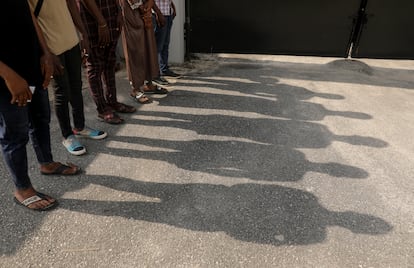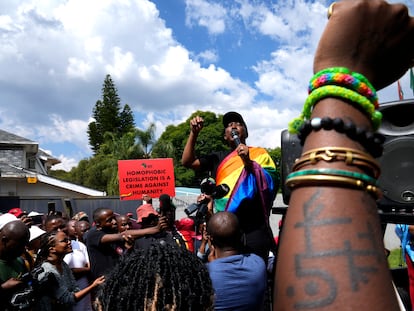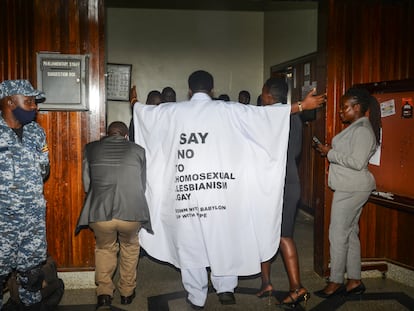Dozens arrested for attending gay weddings: This is how Nigeria persecutes the LGBT population
Human rights activists denounce mass arrests of people accused of homosexuality and extortion by security forces. Same-sex relationships are sentenced to up to 14 years in prison in the African country

At the end of August, some 70 youth were detained in Nigeria’s southern Delta state, accused of organizing a same-sex wedding. Another 76 people were detained in October for organizing a similar event in the northeastern Gombe state. These mass detentions seem to send a clear message: LGBT people are less welcome than ever in Nigeria, the most populous state in Africa, at nearly 240 million inhabitants.
That is certainly how it seems to Francis Ndimele. Only a month after the mass arrest in August, which made headlines, he forced to emigrate from his home in Lagos to the United States. “My parents disowned me in 2020 after discovering I was gay. I had the support of an LGBTQI+ group that gave me shelter in Lagos. Despite this, my family kept sending police officers to chase me. They believe my sexual identity is an embarrassment to the family, especially since they are clergymen from an apostolic church. And the Nigerian police use the arrest of LGBT+ people for extortion, knowing that the law does not protect us,” the 24-year-old says, bitterly.
In 2014, the then-president of Nigeria, Goodluck Ebele Jonathan, enacted legislation banning same-sex relationships, as well as any public display of same-sex affection or membership of LGBTQ+ groups. The law imposes a penalty of up to 14 years in jail for anyone who “enters into a same-sex marriage contract or civil union,” and sentences up to 10 years in jail anyone who “registers, operates, or participates in gay clubs, societies, and organizations” or who even supports said groups. Nigerian lawyers and human rights activists argue that the draconian law is a violation of basic universal freedoms, and that the police regularly use it to make arbitrary arrests, and even to torture arrestees.
Lagos-based lawyer Chizelu Emejulu defends LGBT people in different Nigerian states. He says, “It seems that [the anti-LGBT law] was only passed in order to harass and extort.” It is an instrument of the government “to suppress democracy,” he says. Emejulu points out that no one has been convicted in the African country since the homophobic law came into effect a decade ago, and says that all the individuals who were arrested during the most recent raid were released on bail, although the court has ordered them to appear every month since. No charges have yet been brought against them.
Nigerian police applied the law for the first time in 2019, when they processed 47 men for “public show of same-sex amorous relationship,” according to human rights organizations like Human Rights Watch, although that case was dismissed because the prosecution did not present any witnesses in court.
In January, the United Nations Commission on Human Rights joined critics of the law with its Universal Periodic Review, a periodic review that analyzes the state of human rights around the world every four and a half years. The U.N. recommended that the Nigerian government withdraw the anti-homosexuality law, the liberation of anyone who had been arrested based on their sexual orientation and the end of persecution of the LGBT community, according to Human Rights Watch, which warns that this kind of recommendation has “little to no impact” on these kinds of issues.
Parades of humiliation
Human rights activists have also raised the alarm over Nigeria’s latest group arrests being paired with a humiliating police tactic: pre-trial media parades of detainees. The Nigerian Supreme Court declared in 2022 that this practice violates the Constitution, but during last August’s arrest, the police operation was streamed live on social media, as has been the case with most homophobic arrests.
Lawyer Stephen Okiroro stresses that these practices go against Section 36 of the Nigerian Constitution, which guarantees the presumption of innocence. “Public parading of suspects by Nigerian security agents was common during the military era, when the repressive military government suspended several human rights laws. Now we have a democratic government, and one of its values is fundamental human rights,” he says.
Only 22 of the 54 African countries allow same-sex relationships. Although in Nigeria, the law establishes prison sentences, in 12 of the country’s 36 states where Sharia (Islamic law) is in force, the death penalty can be applied to members of the LGBT community or to those who go against traditional norms of behavior. In November, local media reported the arrest of eight young men for “immoral dress.” The accusation: dressing in garments considered to be women’s clothing. The punishment: three months in prison and 10 lashes. “Transvestism” is being targeted by the federal government, warn organizations such as Human Rights Watch. In April, a legislator introduced an amendment to the law against same-sex marriage that imposes penalties of six months’ imprisonment or fines of 500,000 naira ($513).
The privilege to flee
Those who can, escape this suffocating environment. “I had already planned to travel and had my visa, but I got help from human rights advocates to pay for my flight reservation to the United States, where I now consider myself safe,” says Ndimele, the young man persecuted by his relatives. “My parents are happy that I am no longer around and that their church members can no longer make fun of them.” Daniel Orji, who lived in the southwestern Nigerian state of Ogun, also left the country after being fired from his job. “A colleague saw me in a gay venue when I was on vacation, took pictures of me on the sly and sent them to the office. They fired me and asked me never to come back, under threat of reporting me. I got a job in the U.K. and moved about six months ago,” he says. “[In Nigeria] we face all kinds of discrimination from people at work and in all other social encounters. I feel very sorry for those who can’t travel like me. It’s really hellish.”
Ndimele and Orgi were lucky to be able to flee the country, but leaving isn’t an option for everyone. One of the people who don’t have that privilege is Kunle Adeagbo, who says he has been detained and extorted on various occasions. “I live in fear. The law doesn’t just allow the police to treat LGBT people in an inhumane way, it also subjects us to mob violence. I was once injured in the street on the way to a party. But it was hard for me to go and report it at the police station because of the stigmatization and discrimination committed by those who are supposed to protect the lives and property of citizens.” Adeagbo eventually worked up the courage to report his assailants, but the accusation backfired. “The police detained me, tortured me, kept me in custody and forced me to confess that I’m gay. They only released me after I paid them,” he says. “We are not asking for very much, we just want the violence to stop so that human rights defenders and organizations that provide services to LGBT people can freely support us.”
The spokesperson for the Nigerian police force, Muyiwa Adejobi, did not respond to calls or text messages sent by this publication. The Nigerian Minister of Justice did not respond to questions, either.
A law that violates the Constitution
Benjamin Abiboye, human rights lawyer, says that Article 40 of the Nigerian Constitution states that every citizen has the right to freely assemble and associate with others, and in particular, form or belong to political parties, unions or any other association to protect their interests. “So, why should the anti-LGBT law punish people for gathering peacefully? Why should the government look the other way when there is mob violence against them?” he asks. The law Nigeria passed in 2014 “is the most repressive law passed since the return of democracy to the country in 1999,” he says. Okiroro agrees: “Freedom of association is a fundamental human right in a functioning democracy, and it is essential that the government provide space for people to express different views and defend their common interests.”
In addition to violating the Nigerian Constitution, the homophobic law also violates international human rights agreements, like the African Charter on Human and Peoples’ Rights, which guarantees the right to freedom of expression, freedom of association, freedom of assembly and the equality of all people. The International Covenant on Civil and Political Rights, which Nigeria assented to with reservations in 1993, assures the equality of all people before the law and their right to not suffer from discrimination.
Sign up for our weekly newsletter to get more English-language news coverage from EL PAÍS USA Edition









































